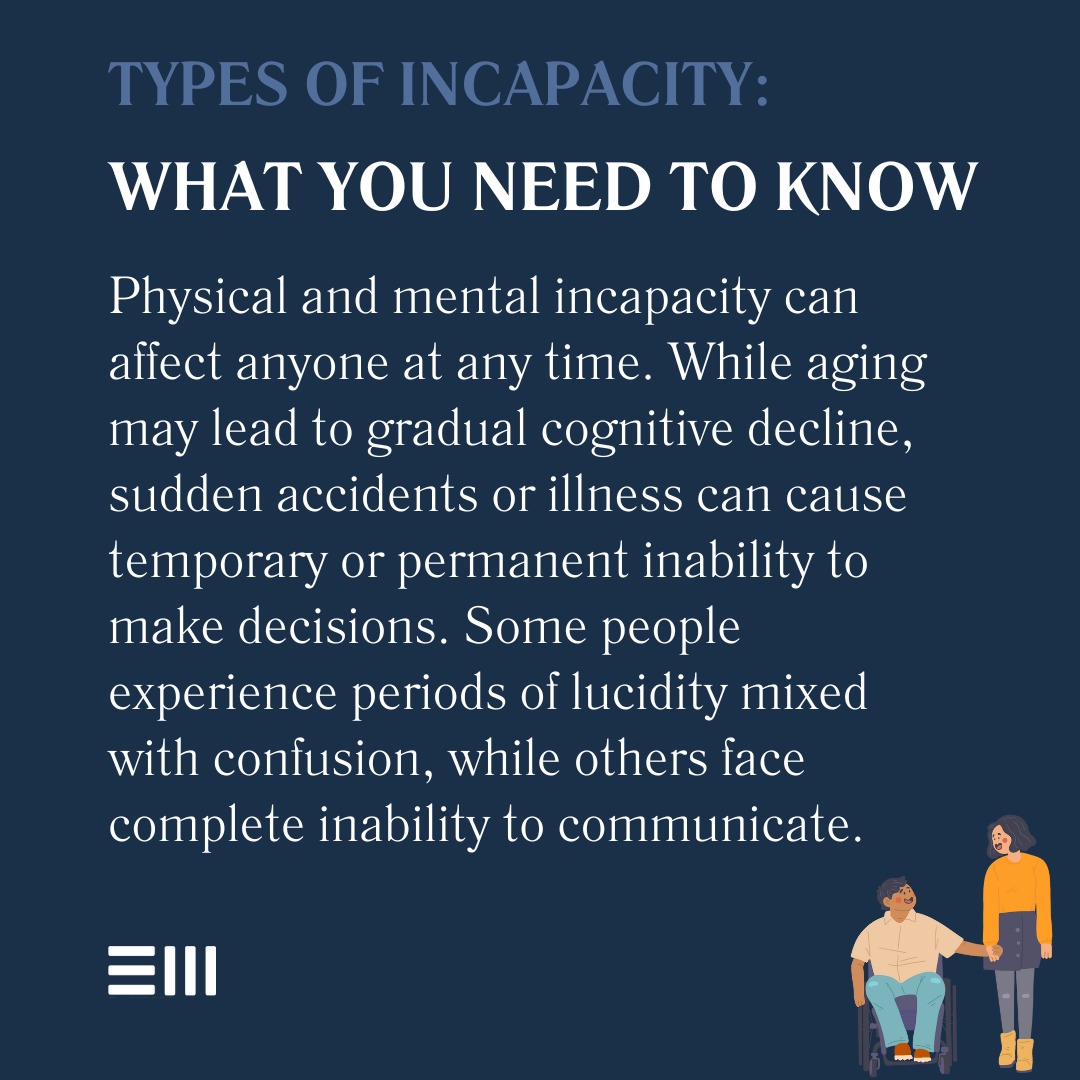Nearly 70% of Americans will require long-term care at some point after turning 65, yet less than a third have made legal arrangements for their potential incapacity.
A single moment can change everything.
A stroke, an accident, or an unexpected diagnosis can leave you unable to make critical decisions about your medical care and finances.
Without proper estate planning planning, your family could face months of legal battles just to help manage your affairs.
Estate planning puts you in control of your future care, ensuring your wishes are honored even when you can't speak for yourself.
Understanding Incapacity Planning
Incapacity doesn't just affect the elderly—accidents, sudden illness, or cognitive decline can strike at any age.
A comprehensive estate plan provides the legal framework to protect your medical care preferences and financial interests if you become unable to make decisions.
Understanding how incapacity planning works helps ensure your wishes are honored and your assets are protected.
Types of Incapacity to Plan For
Before creating an incapacity plan, it's important to understand the different types of situations it can address:
- Physical Incapacity: Conditions that prevent you from communicating or making decisions;
- Mental Incapacity: Cognitive decline, dementia, or mental health conditions affecting decision-making;
- Temporary Incapacity: Coma, severe illness, or recovery periods requiring temporary assistance;
- Gradual Decline: Progressive conditions requiring increasing levels of support over time; and
- Sudden Incapacity: Accidents or medical emergencies requiring immediate decision-making authority.
Understanding these scenarios helps create a comprehensive plan that addresses various possibilities.
Key Estate Planning Tools for Incapacity
Before exploring specific legal documents, it's important to understand how different estate planning tools work together to provide comprehensive protection during incapacity.
Durable Power of Attorney
This critical document allows your chosen agent to manage your financial affairs if you become incapacitated.
They can:
- Pay bills and manage accounts;
- File tax returns;
- Manage investments;
- Handle real estate transactions;
- Apply for government benefits; and
- Maintain insurance policies.
Medical Power of Attorney
Your healthcare agent can make medical decisions on your behalf, including:
- Choosing healthcare providers;
- Consenting to treatments;
- Accessing medical records;
- Implementing end-of-life care preferences;
- Coordinating with insurance companies; and
- Ensuring your religious beliefs are respected.
Living Will
A Living Will outlines your preferences for:
- Life-sustaining treatments;
- Pain management;
- Organ donation;
- Artificial nutrition and hydration;
- Comfort care options; and
- Religious or cultural considerations.
HIPAA Authorization
Ensures your chosen representatives can:
- Access medical records;
- Communicate with healthcare providers;
- Coordinate care between facilities;
- Handle insurance claims;
- Participate in medical consultations; and
- Receive test results and updates.
Revocable Living Trust
Provides continuous asset management through:
- Seamless transition of control;
- Private administration;
- Flexible distribution options;
- Tax planning opportunities;
- Professional management if needed; and
- Protection from exploitation.
Additional Legal Tools
Other important components include:
- Representative payee designation;
- Joint property ownership;
- Advanced care directives;
- Guardianship nominations;
- Banking and investment authorizations; and
- Insurance policy designations.
These tools form the foundation of a strong incapacity plan that protects both your healthcare and financial interests.
Benefits of Incapacity Planning
Proper incapacity planning offers several crucial advantages for you and your loved ones:
Healthcare Benefits
Healthcare decisions during incapacity require careful planning to ensure your wishes are respected and your dignity maintained. A proper healthcare directive provides essential protections for your medical care through:
- Ensures your medical preferences are followed;
- Prevents unwanted treatments;
- Maintains dignity in care decisions;
- Reduces family stress during crises;
- Coordinates care between providers; and
- Protects religious/cultural preferences.
With these healthcare protections in place, you can rest assured that your medical care will align with your values and preferences, while your loved ones have clear guidance for making critical decisions.
Financial Protection
Managing finances during incapacity demands thorough preparation to protect assets and maintain financial stability. Through powers of attorney and other planning tools, you can:
- Safeguards assets from mismanagement;
- Ensures bills are paid promptly;
- Protects investments and property;
- Maintains business operations;
- Prevents financial exploitation; and
- Preserves estate planning goals.
These financial safeguards help maintain your financial stability and protect your assets, ensuring continuity in managing your affairs even during periods of incapacity.
Family Benefits
Incapacity can strain family relationships without proper planning. Clear directives and designated authority help preserve family bonds by:
- Preventing conflicts over decisions;
- Providing clear authority;
- Reducing emotional burden;
- Maintaining family harmony;
- Speeding up response in emergencies; and
- Preserving relationships.
By establishing these clear guidelines and authorities, you help your family avoid conflicts and maintain strong relationships during challenging times.
Legal Advantages
Proper incapacity planning provides crucial legal protections while minimizing complications and expenses. A comprehensive plan helps by:
- Avoiding court intervention;
- Maintaining privacy;
- Reducing legal expenses;
- Preventing delays in care;
- Ensuring smooth transitions; and
- Protecting against challenges.
These legal protections help avoid costly court proceedings while maintaining privacy and ensuring smooth implementation of your wishes.
Common Questions About Alabama Incapacity Planning
Understanding how Alabama incapacity planning works helps you make informed decisions about your future care.
Here are answers to frequently asked questions we receive.
What Happens Without an Incapacity Plan?
Courts may appoint a guardian to manage your affairs, resulting in lengthy proceedings, family disputes, and loss of privacy.
When Should I Start Incapacity Planning?
The ideal time is now, while you have full mental capacity to make legally binding decisions about your future care.
How Often Should I Update My Incapacity Plan?
Review your plan every 3 to 5 years or after major life changes like marriage, divorce, births, or relocations.
Who Should I Choose as My Healthcare Agent?
Select someone who understands your values, can handle stress, and will advocate for your wishes even under pressure.
Can I Change My Mind About My Incapacity Plan?
Yes, you can modify or revoke your incapacity planning documents as long as you maintain mental capacity.
Secure Your Future Today
Don't leave your healthcare and financial decisions to chance. Contact Baxley Maniscalco today to create a comprehensive incapacity plan that protects you and your loved ones.
Our experienced team will guide you through every step of creating a personalized plan that ensures your wishes are honored.


